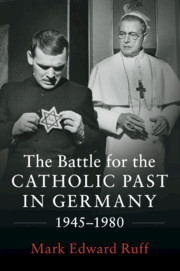
- Cited by 3
-
Cited byCrossref Citations
This Book has been cited by the following publications. This list is generated based on data provided by Crossref.
O'Sullivan, Michael E. 2019. Religion, Modernity, and Democracy in Central Europe: Toward a Gendered History of Twentieth-Century Catholicism. Central European History, Vol. 52, Issue. 4, p. 713.
Ruff, Mark Edward 2020. Building Bridges between Catholicism and Socialism: Ernst-Wolfgang Böckenförde and the Social Democratic Party of Germany. Contemporary European History, Vol. 29, Issue. 2, p. 155.
Patch, William L. 2021. Defending the “Peace of Sunday”: The Debate over Sunday Labor in the West German Steel Industry after the Second World War. Central European History, Vol. 54, Issue. 4, p. 646.
- Publisher:
- Cambridge University Press
- Online publication date:
- July 2017
- Print publication year:
- 2017
- Online ISBN:
- 9781108116107


